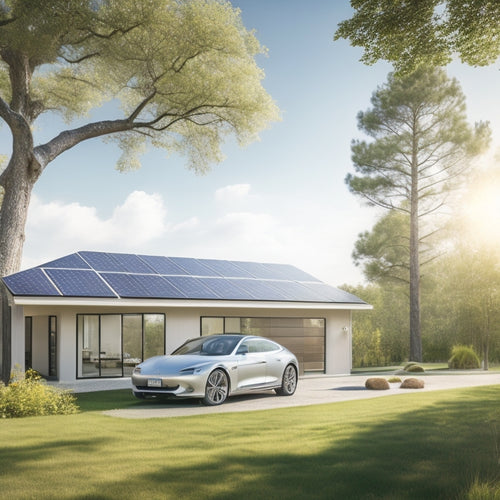
What Is the Estimated Cost to Install Solar Panels
Share
You can expect to pay between $15,000 and $30,000 for a typical residential solar panel system, with the overall cost depending on various factors, including the type of panels, installation location, and roof size. The cost per watt ranges from $1.50 to $3.50, with monocrystalline panels being the priciest. Financing options, such as solar loans, power purchase agreements, and leasing, are also available. As you consider switching to solar energy, understanding the factors that influence installation costs will help you make an informed decision, and there's more to investigate to get an accurate estimate for your specific needs.
Key Takeaways
- The average cost of solar panels ranges from $1.50 to $3.50 per watt, depending on the type of panel.
- A typical residential solar system costs between $15,000 to $30,000, with financing options available.
- Installation location, panel type, roof size, and installer experience affect the overall cost of installation.
- The cost of solar panels accounts for up to 50% of the total installation cost, with labor and other components adding to the total.
- System size also impacts cost, with a 2 kW system costing around $6,000 to $8,000 and a 10 kW system exceeding $30,000.
Average Cost of Solar Panels
With the rising popularity of renewable energy, you're probably wondering how much it costs to join the solar revolution. The average cost of solar panels varies depending on the type and quality of the system.
Monocrystalline solar panels are the most efficient and expensive option, with prices ranging from $2.50 to $3.50 per watt. Polycrystalline solar panels are a more affordable option, costing between $2.00 and $3.00 per watt. Thin-film solar panels are the least expensive, priced around $1.50 to $2.50 per watt.
For a typical residential solar panel system, you can expect to pay between $15,000 and $30,000.
However, financing options are available to help make solar energy more accessible. You can consider solar loans, power purchase agreements, or leasing options to reduce the upfront cost. Many solar panel manufacturers and installers also offer financing solutions, making it easier to switch to renewable energy.
Factors Affecting Installation Cost
Determine your solar panel installation cost by considering several key factors. These factors can greatly impact the overall cost of your solar panel system.
One essential factor is the installation location. The cost of installation varies depending on the state and region you're in. For instance, installations in California tend to be more expensive than those in other states. Additionally, the type of panel you choose also affects the cost. Monocrystalline panels, for example, are more expensive than polycrystalline panels.
| Factor | Impact on Cost |
|---|---|
| Installation Location | Higher cost in states with higher labor costs and permits |
| Panel Type | Different panel types have varying price points |
| Roof Size and Complexity | Larger or more complex roofs require more materials and labor |
| Installer Experience | More experienced installers may charge higher prices for their services |
Understanding these factors will help you estimate your solar panel installation cost accurately. By considering these variables, you can make an informed decision about your solar panel investment.
Cost Breakdown by Component
You've considered the factors that affect your solar panel installation cost, now it's time to drill down into the specific components that make up that cost.
The biggest chunk of your installation cost comes from the solar panels themselves, which can account for up to 50% of the total cost. The quality of these components plays a significant role in determining the overall cost, with high-efficiency panels commanding a higher price tag.
The next largest component is the installation labor cost, which can range from 15% to 30% of the total cost, depending on the installation complexity. This includes the cost of hiring a professional installer, obtaining necessary permits, and connecting your system to the grid.
Inverters, which convert DC power from the panels to AC power for your home, typically account for around 10% of the total cost. Mounting hardware, wiring, and electrical components make up the remaining 10% to 20% of the total cost.
Understanding the cost breakdown by component can help you make informed decisions about your solar panel installation.
Pricing by System Size
The cost of a solar panel installation varies considerably depending on the system size, which is typically measured in watts (W). As you contemplate installing solar panels, you'll need to determine the system capacity that's right for your needs. A larger system will produce more electricity, but it will also be more expensive.
System sizes typically range from 2 kilowatts (kW) to 10 kW or more. A 2 kW system, suitable for small homes or apartments, might cost around $6,000 to $8,000. A 5 kW system, suitable for medium-sized homes, might cost between $15,000 to $20,000. Larger systems, such as 10 kW or more, can cost upwards of $30,000 or more.
Your installation location also plays a significant role in determining the cost. Installations in urban areas tend to be more expensive than those in rural areas due to higher labor and permitting costs.
Additionally, the complexity of the installation, such as the need for special mounting systems or electrical upgrades, can also impact the final cost. As you plan your solar panel installation, be sure to contemplate your system capacity and installation location to get an accurate estimate of the costs involved.
Incentives and Rebate Options
As you consider the cost of your solar panel installation, it's important to factor in the various incentives and rebate options available to you.
Federal incentives, such as the Solar Investment Tax Credit (ITC), can greatly reduce your upfront costs. The ITC allows you to claim a tax credit of 26% of your total solar panel installation cost. This credit can be claimed on your federal income taxes, providing a substantial reduction in your tax liability.
In addition to federal incentives, you may be eligible for state rebates and incentives. These vary by state, but can include rebates, tax credits, or property tax exemptions.
For example, California offers a rebate of $0.20 per watt for residential solar installations, up to a maximum of $1,500. Other states, like New York, offer a tax credit of 25% of your installation cost, up to $5,000.
Be sure to research the specific incentives and rebates available in your state to maximize your savings.
Frequently Asked Questions
Can I Install Solar Panels on a Rented Property?
You'll need to review your renter agreements, as installation restrictions often apply; however, some landlords might be open to solar installations, especially if you're willing to cover the costs and guarantee a smooth, non-invasive process.
Do Solar Panels Work During Power Outages?
You're wondering if solar panels work during power outages. The answer is, they don't, unless you have energy storage solutions like batteries, which can provide backup power when the grid goes down, ensuring peak solar panel efficiency.
Are Solar Panels Resistant to Extreme Weather Conditions?
You'll be pleased to know that solar panels are built to withstand harsh conditions, boasting impressive durability and extreme weather resilience, so you can rely on them to generate power even in the face of intense storms or scorching heat.
How Often Should Solar Panels Be Cleaned and Maintained?
"An ounce of prevention is worth a pound of cure." You should clean your solar panels every 6-12 months, depending on environmental factors, to guarantee peak energy output, as regular maintenance frequency can increase efficiency by up to 25%.
Can I Sell Excess Energy Generated Back to the Grid?
You can sell excess energy back to the grid through net metering benefits, which allow you to offset your energy consumption and earn credits. Many utilities offer energy buyback programs, letting you profit from your renewable energy investment.
Related Posts
-

Why Higher Upfront Costs Are Worth It
You pay a premium for high-quality, energy-efficient products, but they're worth it. With durability testing ensuring...
-

Why Invest in Solar Car Battery Chargers Online?
By investing in a solar car battery charger online, you're not only reducing your reliance on fossil fuels but also o...
-

Top Online Stores for Solar Car Accessories
When searching online for solar car accessories, you'll find top retailers like Amazon, REI Co-op, and Best Buy offer...


